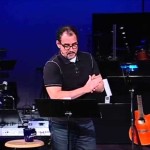We run our website the way we wished the whole internet worked: we provide high quality original content with no ads. We are funded solely by your direct support. Please consider supporting this project.

Q&A: Already-Not-Yet
Question: My question is regarding our “entanglement” with Christ that you spoke about a few weeks ago. In the sermon you noted how we are joined with Christ like those two particles that can be separated by light years of distance and yet both will react equally to a force acting on the other one. So here is my question: If I am entangled with Christ who is never affected/influenced by sin, temptation etc…, how and why do those things affect/influence me?
Answer: As I mentioned in my sermon, the New Testament teaches that we are in a curious stage of history in which all that is true about us and the world because of Christ is not yet manifested as true. This is what scholars sometimes refer to as “the already-not-yet” tension of the NT. So, as Hebrews 2 teaches, for example, all things are already ‘put under our feet,” but we do not yet see all things put under our feet (Heb. 2:7-8).
Here’s an analogy. When you turn on a light, it looks to you like the room is instantly made bright. Yet, if you were (say) a sub-atomic particle called a muon which travels close to the speed of light and exists for only a fraction of a second, it would take half a lifetime or more for that room to be filled with light. So too, from God’s perspective, the gap between what Christ accomplished when he died and rose again is almost non-existent, though from our perspective it has already taken 2,000 years and may, for all we know, take another 20,000 years before the cosmos reflects the truth of all Christ accomplished. Like Scripture says (2 Pet. 3), a day with the Lord is like a 1,000 years for us.
The same is true of us. We’re sort of a microcosm of the cosmos. It is true that we are entangled with Christ, but we don’t yet see this truth perfectly manifested in our life. Our task, however, is to yield to the Spirit and manifest as much of this truth now as we possibly can. We are to be the “already” in the midst of the “not yet”. We’re to put on display, as much as possible, what heaven will look like when it finally comes. And we do this by first envisioning ourselves as we truly are, taking every thought captive to Christ (2 Cor. 10:5) and by then living our lives in accordance with who we truly are, as much as possible.
That is faith: envisioning the truth about ourselves and every other person we see as a “substantial reality” (Heb. 11:1), and then stepping into that vision by how we conduct ourselves in our day-to-day lives.
Category: General
Tags: Identity in Christ, Kingdom Living, Quantum Physics
Related Reading

Our Sacred Scared
Tom Lin via Compfight Glennon Doyle Melton is the voice behind Momastery. She is a brave, funny and challenging writer who has decided to tell the truth after years of drug and alcohol abuse and bulemia. Recently, Glennon has invited a series of men and women (including Rachel Held Evans, Jamie the Very Worst Missionary,…

What is the Kingdom of God (Part 1)
We all know what the Kingdom of God is, right? But this is precisely the problem. Since we are all to a large extent products of our culture, what seems obviously true and right to us will be at least influenced, if not determined, by what seems obviously true and right to our culture. This,…

The Kingdom of God ≠ Political Activism
Given the centrality of following Jesus’ example, it is vitally important we not only notice that Jesus was a revolutionary (see post) along with some ways that we can join his revolution (see that post here), but how he was a revolutionary. Many Christians today assume that in order to revolt against ungodly aspects of…

A Restless Heart
What is the “good news” of the Gospel? How can we find rest in Jesus? Here’s another video from The Work of the People that examines these questions.

Sermon Clip: Tough To Love
Learning how to love the people in our life that we find challenging to deal with is often very difficult. This week in Heart Smart Greg Boyd looks at some biblical examples and instructions on how to love our enemies in the same way we love our friends. Full Sermon Here: http://whchurch.org/sermons-media/sermon/tough-to-love

Don’t Be a Functional Atheist at Christmas
All of us raised in Western culture have been strongly conditioned by what is called a secular worldview. The word secular comes from the Latin saeculum, meaning “the present world.” A secular worldview, therefore, is one that focuses on the present physical world and ignores or rejects the spiritual realm. To the extent that one…
